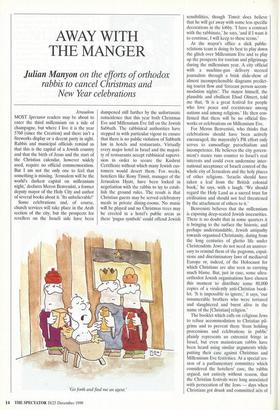AWAY WITH THE MANGER
Julian Manyon on the efforts of orthodox rabbis to cancel Christmas and New Year celebrations
Jerusalem MOST Spectator readers may be about to enter the third millennium on a tide of champagne, but where I live it is the year 5760 (since the Creation) and there isn't a fireworks display or a decent party in sight. Rabbis and municipal officials remind us that this is the capital of a Jewish countty and that the birth of Jesus and the start of the Christian calendar, however widely used, require no official commemoration. But I am not the only one to feel that something is missing. 'Jerusalem will be the world's darkest capital on millennium night,' declares Meron Benvenisti, a former deputy mayor of the Holy City and author of several books about it. 'Its unbelievable!'
Some celebrations and, of course, church services will take place in the Arab section of the city, but the prospects for revellers on the Israeli side have been dampened still further by the unfortunate coincidence that this year both Christmas Eve and Millennium Eve fall on the Jewish Sabbath. The rabbinical authorities have stepped in with particular vigour to ensure that there is no public violation of Sabbath law in hotels and restaurants. Virtually every major hotel in Israel and the majori- ty of restaurants accept rabbinical supervi- sion in order to secure the Kashrut Certificate without which many Jewish cus- tomers would desert them. For. weeks, hoteliers like Rony Timsit, manager of the Jerusalem Hyatt, have been locked in negotiation with the rabbis to try to estab- lish the ground rules. The result is that Christian guests may be served celebratory meals in private dining-rooms. No music will be played and no Christmas trees may be erected in a hotel's public areas as these 'pagan symbols' could offend Jewish 'Go forth and find me an agent.' sensibilities, though Timsit does believe that he will get away with some less specific decorations in the lobby. 'I have a contract with the rabbinate,' he says, 'and if I want it to continue, I will keep to these terms.'
At the mayor's office a slick public- relations team is doing its best to play down the glitch over Millennium Eve and to play up the prospects for tourism and pilgrimage during the millennium year. A city official with a machine-gun delivery steered journalists through a brisk slide-show of almost incomprehensible diagrams predict- ing tourist flow and 'forecast person accom- modation nights'. The mayor himself, the plausible and ebullient Ehud Olmert, told me that, 'It is a great festival for people who love peace and coexistence among nations and among religions.' He then con- firmed that there will be no official fire- works or celebrations on Millennium Eve.
For Meron Benvenisti, who thinks that celebrations should have been actively encouraged, the mayoralty's PR effort only serves to camouflage parochialism and incompetence. He believes the city govern- ment's stance runs counter to Israel's real interests and could even undermine inter- national acceptance of Israeli control of the whole city of Jerusalem and the holy places of other religions. 'Israelis should have taken a leaf from the British colonial book,' he says, with a laugh. 'We should regard the Holy Land as a sacred trust for civilisation and should not feel threatened by the attachment of others to it.'
Benvenisti believes that the millennium is exposing deep-seated Jewish insecurities. There is no doubt that in some quarters it is bringing to the surface the historic, and perhaps understandable, Jewish antipathy towards organised Christianity, dating from the long centuries of ghetto life under Christendom. Jews do not need an anniver- sary to remind them of the pogroms, expul- sions and discriminatory laws of mediaeval Europe or, indeed, of the Holocaust for which Christians are also seen as carrying much blame. But, just in case, some ultra- orthodox Jewish organisations have chosen this moment to distribute some 80,000 copies of a virulently anti-Christian book- let. 'It is impossible to ignore,' it says, 'our innumerable brothers who were tortured and slaughtered and burnt alive in the name of the [Christian] religion.'
The booklet which calls on religious Jews to refuse accommodation to Christian pil- grims and to prevent them 'from holding processions and celebrations in public' plainly represents an extremist fringe in Israel, but even mainstream rabbis have been heard using similar arguments while putting their case against Christmas and Millennium Eve festivities. At a special ses- sion of a parliamentary committee which considered the hoteliers' case, the rabbis argued, not entirely without reason, that the Christian festivals were long associated with persecution of the Jews — days when Christians got drunk and committed acts of violence. What's going on in Jerusalem is not exactly the touchy-feely version of reli- gion that may be on view somewhere in New Labour's Millennium Dome, but it is part of the real background to the anniver- sary in the city where Christ was crucified.
Meron Benvenisti believes that Israelis must now try to put such isolationist feelings behind them and to become more self-confi- dent in their dealings with Christianity. Not least, he says, because if Jews fail the millen- nium test, the Palestinians stand ready to snatch the whole idea of the Holy Land away from them. 'Who is reaping the benefit of our failure?' he asks. 'Yasser Arafat, and ' he's doing it brilliantly.' The Palestinian leader is, of course, a Muslim but he has seized on the Christian millennium with the enthusiasm of a man who has few other straws to grasp at Bethlehem is under the control of his Palestinian Authority, which is making every effort to use the birthplace of Christ as a stage-set to show off the Pales- tinian leader and his government at their benevolent best.
Bethlehem is a mere 20 minutes from Jerusalem, but the short drive there pro- vides ample evidence of the hatred and spite that still mark the Arab—Israeli dis- pute, in spite of the much ballyhooed peace process. Leaving Jerusalem you pass Har Homa, the Israeli settlement judged illegal by the European Union and the scene of Robin Cook's bungled protest visit in a hail-storm a year and a half ago. Today, protests ignored, the hill has been stripped bare, the cranes and bulldozers are at work, and Israeli newspapers are advertis- ing the soon-to-be-completed apartments at /90,000 each.
A little further on there's more building work closer to the road and the shape of Israel's millennium present to the Pales- tinian Authority becomes clear. Due to open on 23 December, it is a new check- point to replace the present ramshackle barrier which controls the movements of Palestinians in and out of Bethlehem. Under the new system, tourists, VIPs and Israeli settlers will drive on the main road, while Palestinians will have to walk 650 metres to a building where they will be processed by Israeli security. Palestinian officials are incensed by the plan, compar- ing it to apartheid. Their mayor, Hanna Nasser, claims that the timing of the move is a deliberate attempt to provoke the Palestinians on the eve of the millennium celebrations. 'If they do this they are intending to create new problems with us, and it will be very bad,' he warns.
The little town itself is still a hive of building work as it undergoes an unprecedented face-lift. One hundred million dollars in foreign aid, of which Britain has contributed £2 million, have renovated the sewage and electricity sys- tems and transformed Manger Square from a dirty carpark into a spotless plaza with trees in tree-guards and more than a whiff of Milton Keynes. But the squat bulk of the Church of the Nativity still adds a special drama. First built by the Emperor Constantine and rebuilt by Jus- tinian, it contains beyond the smoke- stained pillars the cave where Christ is said to have been born, the true focal point of the millennium.
Outside, between the church and the square, the Palestinians have erected a large stage where their millennium extrav- aganza will take place in the full glare, they hope, of world attention. We are told that choirs from all over the world will per- form, including the Coro Nacional of Cuba, and, on Millennium Eve at the stroke of midnight, 2,000 doves of peace will be released in front of a doubtless beaming Yasser Arafat. There have been hiccups in the arrangements. The Israeli authorities have once again refused to allow the importation of a Christmas tree donated by a Norwegian town on the grounds that it might contain parasites or plant disease (Christmas lights have been hung on an old cedar tree instead), and plans to assemble 2,000 sheep in a nearby field have thankfully been shelved. There is also some uncertainty about the guest-list, with every effort being made to attract international dignitaries but with the final tally still unknown.
I certainly intend to join the Bethlehem celebrations, if I can get past the jams at the Israeli checkpoint and the sometimes hysterical attentions of the Palestinian traffic police, but I have my own concerns about the course of events. Along with many other television correspondents, I will be 'going live' as the 2,000 doves rise into the night sky, but will Yasser Arafat's men manage to get them out of their cages on time, and what will happen to the doves when the fireworks start up seconds later? Carnage among the doves of peace will not look good on television. Viewers, if they can lower their champagne glasses, will be the first to know.
Julian Manyon is ITN's Middle East corre- spondent. This article is also reproduced for ITN online and can be seen at www.itn.co.uk.























































































































 Previous page
Previous page